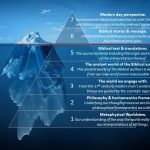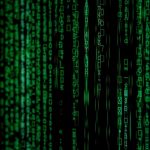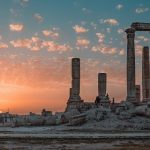SCIENCE
The problem of spontaneity in quantum mechanics
Published on October 25, 2020
by Willie Mc Loud
The problem of indeterminism in quantum physics is profound; such is the solution to that problem. I show how indeterminism (spontaneity) and determinism are accounted for in Kantian metaphysics and how this provides us with a viable way to understand our world – especially indeterminism in quantum physics. When the metaphysical implications thereof are considered, the atheistic worldview becomes untenable.
We all engage on a daily basis with the world around us. We have various experiences of and in our world. Our experience is complemented with the more substantial, careful and systematic study of our world which goes far beyond our everyday experience in the framework of science. When we consider all the information that becomes available to us, we may confront the important question: What is the cosmos really like? What is the totality of our existence? Are we only matter or are there other aspects to our universe that go beyond that? These are difficult questions and philosophers and theologians have been thinking about them for a very long time.
In this essay I engage with these questions in the context of quantum physics, using the philosophy of one of the greatest philosophers of all time, Immanuel Kant (1724-1804). The reason for doing so is that his approach to these questions have special relevance to our current situation – his conceptualization of the world is in remarkable agreement with the newest developments in science (see below). On the one hand, Kant was concerned with the question of grounding science. As such he was especially interested in the question: What is knowledge? On the other hand, Kant engaged with the question of human freedom. For Kant, the possibility of human freedom (of choice) implies that our world may include an aspect that goes beyond the realm of experience (and experiment; the world of knowledge); a supersensible realm in which absolute spontaneity would be seated.
The question of freedom is very important one insofar as we want to engage with the larger questions about our human existence. If our world is merely mechanistic (everything is just matter which is deterministically connected), then humans merely have the illusion that they are free. If humans, however, really have free choice, the world cannot merely consist of matter; it must have some aspect to it that goes beyond matter and makes such freedom possible. Kant developed a conceptual framework (we may call it a metaphysical framework) in which both determinism and freedom are accommodated. In this regard, he did not merely focus on human freedom, but also on the more basic possibility of freedom or spontaneity which would make human freedom possible. This possibility has now been confirmed in science. This implies that the world is more than mere matter.
On the possibility of freedom
In Kant’s view, there is only one way to account for both the possibilities of freedom and determinism, namely that the world be conceptualized as consisting of two aspects, namely nature and a supersensible (noumenal) realm outside nature. The concept of nature as a system captures the possibility of determinism (which is called “mechanism” in the context of nature) in its absolute totality, i.e. as referring to the totality of all possible mechanistic (deterministic) connections in the world. The “laws of nature” are possible as laws because of this deterministic causal (i.e. predictable) link between the objects of nature. To the extent that objects in the world are objects of nature, we can bring them within our experiential or experimental reach. As such we can gain empirical access to such objects in space and time and gain knowledge about them.
The concept of the supersensible realm, on the other hand, refers to a possible aspect of our world where objects are not deterministically connected. Since we cannot engage empirically with such objects (for that we need a deterministic causal connection between the objects and our measuring devices), they would be “supersensible”, that is, outside our experiential and experimental reach. Since we cannot access such a realm with our senses or instruments, we can merely think it – that’s why it is also called a “noumenal” realm (from the Greek word for understanding, namely “nous”).
We can think that such a realm may operate according to another rule (than mechanism), namely in accordance with absolute spontaneity (freedom). The only manner in which objects in such a realm could impact our experience or experiments is if they have the ability through this spontaneous causality to produce outcomes in nature. Then we may become aware of such outcomes. In Kant’s view, such spontaneous causality would be necessary to ground human free will. It would be through such a causality in the supersensible realm that our free choice would become possible.
There are various ways in which we can consider the possibility of such freedom. We can follow a methodological approach in which we consider the mere possibility of such freedom. Insofar as such a realm is outside space and time and classical causality, the logical possibility arises that freedom might be possible in that framework (i.e. there is no contradiction in that). In this case, we are not concerned with what such a realm may be like; we merely assert that it is not in space-time and outside causality and as such we can ascribe freedom to it.
Such a methodological approach may involve taking the empirical data regarding spontaneity in, say, atomic decay, as the basis to formulate a hypothetical rule to guide quantum physics. In this case, we do not worry about the How-question (How is such spontaneity possible?), we merely accept the empirical evidence regarding such spontaneity as it is observed. This is how Niels Bohr got to his “quantum postulate”. The quantum objects that are responsible for these indeterminate (spontaneous according to Bohr) outcomes are outside experimental reach. We can therefore not study them empirically! It is only once the so-called wave packet (which describes the quantum object in its pre-measurement stage) has “collapsed”, that we can observe something.
Bohr believed that the outcomes in quantum physics, which are indeterminate and discontinuous, are indeed spontaneously produced. Recently Hernan Pringe [1] showed how quantum outcomes can be grounded as objective knowledge in the context of Kant’s philosophy. As such, he regards quantum objects as noumenal objects (that is in their pre-measurement stage) and uses the Kantian idea of absolute spontaneity to describe the production of such outcomes.
This implies that Kant’s conception of the noumenal realm cannot any longer be banned from the scientific discussion as Kantian philosophers often assert (they associate it exclusively with his moral philosophy). Kant himself asserted that the noumenal realm should be included in the context of his philosophy of science as he presented it in his Critique of the Power of Judgment (also called the third Critique). In fact, it seems that we now have good reason to think that the world is not merely mechanistically connected and that Kant’s metaphysics, which includes the noumenal realm, might give a better description of the world than other approaches which do not allow for spontaneity (say, Bohm’s view or the “parallel universes” view) or do not say how it is possible. It also means that a very strong case for free will can be made.
How is freedom possible?
In my own study of spontaneity [2], I proceed beyond a mere methodological approach. I am not merely concerned with the logical possibility of absolute spontaneity (spontaneous causality) or the use of hypothetical rules (the quantum postulate). I am also concerned with the more substantial question: How is such freedom possible? In this regard, I engage on a deeper level with the question of freedom.
There are certain conditions for absolute spontaneity to be possible – this involves engaging with the How-question. Kant discusses these conditions in the last part of the first Critique (in the first part of this Critique he is concerned with the conditions for human knowledge). In Kant’s metaphysics these conditions are 1) the existence of a supersensible realm in contradistinction with the existence of nature (i.e. a realm in which determinism is not the governing principle), 2) the ability of objects in that realm to produce outcomes in nature. Kant also shows how we can conceive of the world in this manner.
When we allow for the mere possibility of freedom, this does not mean that such freedom really exist. Once we allow that such freedom may in fact really exist, we have to say how that would be possible. According to Kant freedom can only be “saved” if we allow that the noumenal realm exists (even if we cannot confirm its existence) and that objects in that realm produce outcomes in nature. As such the noumenal realm cannot be of the same kind of existence than nature where mechanism rules (then freedom would not be possible). Rather, we can think that the noumenal realm would only be accessible for another kind of intuition than our sensible intuition, would have an ideal (abstract) space-time structure that would correspond in some manner with our own space-time and would be governed by absolute spontaneity. As such we can positively conceptualize what such a noumenal realm would be like if it existed.
Although I do not dogmatically (in a realist sense) assert the existence of such a noumenal realm, I do think that we have good reason to think that such a realm exists in the form of the quantum realm. This would mean that the quantum realm belongs to a different mode of existence than nature (the “classical” world where the space-time theories of relativity apply). As such, the possibility of absolute spontaneity which is observed in quantum physics (where atomic decay is the most dramatic example), may be explained alongside determinism. We do not have to merely assert the fact of freedom or try to (against all evidence) try to assert determinism (as some philosophers of science have done); we can explain how both are possible and we can reconcile them in the framework of Kant’s philosophy. This might be the only possible manner in which determinism and freedom are reconciled in science; not merely as logical possibilities, but in explaining how both are possible and could co-exist.
The metaphysical implications of this are profound. It means that we can not only account for the indeterminism (spontaneity) that we observe in quantum mechanics; we can also explain it. As such this explanation follows directly from an ontological (i.e. concerned with “existence”) reading of Kant’s philosophy in the first and third Critiques [2]. This means that Kant’s metaphysics, which allows for both nature and a supersensible realm outside nature, might be the best way to understand and explain what our world is like. This also presents the first step in accounting for free will, and the argument that humans are responsible before the law (even the moral law).
In fact, Kant’s philosophy even accepts the existence of the soul (as a noumenal self) which is important in the Kantian conception of free will. If this is, in fact, the only way to explain and reconcile determinism and freedom, then we may finally reject the atheistic worldview – in the sense that a strictly a-theistic (no-god) view would have to exclude the typical metaphysical grounds on which the existence of God is based. As such an a-theistic view necessitates the exclusion of the possibility of spontaneity which requires a supersensible realm; freedom and the supersensible realm opens the door for God. This is why atheistic philosophers and scientists have traditionally supported a pure mechanistic (deterministic) conception of the cosmos. Although the confirmation that the quantum realm conforms to Kant’s conception of the supersensible realm obviously does not prove the existence of God, it belongs to a metaphysical picture that has traditionally been associated with belief in God.
Conclusion
In this essay, I engage with the question: How is freedom possible? I introduce the freedom-determinism debate in the context of Kant’s philosophy. I show that the possible existence of both these opposites is incorporated into Kant’s metaphysics which includes both nature and the supersensible realm outside nature. What is remarkable, is that the Kantian conception of a supersensible realm which grounds absolute spontaneity is now taken seriously in science [1]. As such we have to accept that quantum objects exist as noumenal objects (as Pringe shows) which ground such freedom.
I make the bold claim that we cannot only accept the mere possibility or even the empirical evidence of spontaneity without also asking: How is such freedom possible? We may have to accept that we can only explain such freedom if we conceptualize the quantum world as a different mode of existence. This means that our classical and quantum conceptions of the world refer to two distinct modes of existence. This fits in very nicely with the Kantian metaphysics; this is what we expect if we read the world through the lens of Kantian metaphysics [3].
[1] Pringe, H. 2007. Critique of the Quantum Power of Judgment. A Transcendental Foundation of Quantum Objectivity. Berlin: Walter de Gruyter.
[2] Mc Loud, W. 2015. Introducing a Kantian Interpretation of Quantum Physics, in accordance with Kant’s Philosophy of Science in the Critique of the Power of Judgment, reinterpreted and reworked with special attention to the supersensible realm. Masters thesis. UCT. Cape Town.
Kant, Noumena and Quantum Physics, published in Contemporary Studies in Kantian Philosophy 3 (2018)
Kant, Noumena and Quantum Physics, published in Contemporary Studies in Kantian Philosophy 3 (2018)
[3] I hope to write about ten essays on the implications of the remarkable fit between Kantian metaphysics and our scientific understanding of the world for the Christian-atheist conversation.
Willie Mc Loud is an independent South African scholar with a wide field of interest spanning ancient Middle Eastern studies, Kantian philosophy and philosophy of science. He has got a PhD in Nuclear Physics (Nuclear Fusion), a MSc in Physics, a MA in Philosophy of Science, an Honours degree in Philosophical Hermeneutics and an MBL.




